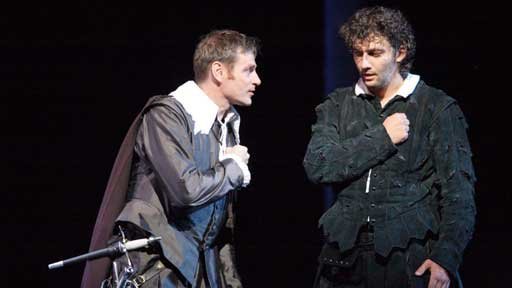|
|
|
|
|
|
|
|
| Opera News, December 2009 |
| GEORGE HALL |
|
|
LONDON — Don Carlo, Royal Opera, Covent Garden, 9/15/09
|
|
Photo: © Catherine Ashmore 2009 |
 Jonas
Kaufmann sang his first Don Carlo in the Royal Opera's latest revival of
Verdi's great score on September 15. He showed an easy command of its
difficulties and was never short of power in the many strenuous passages
while founding his performance on a sweet-toned, clean-edged lyricism
inflected with an intelligent response to the drama. A resourceful actor,
his physicality matched his finely tuned vocalism in a traversal of the role
notable for its constant engagement and consistent impact. Jonas
Kaufmann sang his first Don Carlo in the Royal Opera's latest revival of
Verdi's great score on September 15. He showed an easy command of its
difficulties and was never short of power in the many strenuous passages
while founding his performance on a sweet-toned, clean-edged lyricism
inflected with an intelligent response to the drama. A resourceful actor,
his physicality matched his finely tuned vocalism in a traversal of the role
notable for its constant engagement and consistent impact.
The current Royal Opera production plays the work as Don Carlo, using the
familiar Italian translation and presenting the five-act version of the
piece first staged in Modena in 1884. (In 1996, for the first time ever at
this address, the company staged the work in the original French in a
staging by Luc Bondy, though it has subsequently regressed from this
musicologically correct position.) The present staging is by Nicholas
Hytner, director of London's Royal National Theatre, working with designer
Bob Crowley, and presents a largely dark and oppressive period vision of the
Spanish court while struggling to envision a convincingly spectacular
auto-da-fé.
Also new to the production this time around were Marianne Cornetti's bold
and bracing Eboli, delivered in a vigorous manner and with an ample use of
chest voice. John Tomlinson made his first Covent Garden appearance as the
Grand Inquisitor, a character he plays, aptly, on the grandest scale, and
with a rough, gruff vocalism that is his general mode these days but which
works well in the context.
Simon Keenlyside repeated his Marquis of Posa, vocally an astutely scaled,
elegantly sung portrayal (he was the only cast member to manage a real
trill), conveyed with an attention to the detail of the character's
motivation that revealed that even this out-and-out liberal is not above
using Carlo's dependence on him for his own political ends. Marina
Poplavskaya sang Elisabetta more confidently than two seasons ago, giving
musical shape and purpose to her long, sculpted lines. She suggested
movingly the intense self-denial that becomes the character's way of dealing
with her infinite disappointment and sense of loss.
Ferruccio Furlanetto, the only Italian in this Italian-language production,
benefited from his native connection to the text and from his substantial,
rounded tone to flesh out the sternness of King Philip, though there's an
overall affability to Furlanetto's stage appearances that precluded a deeper
engagement with such a dark character.
The orchestra and chorus (the latter expanded for this epic) had an
outstanding evening under the baton of Semyon Bychkov. Ever a popular
visitor to the Royal Opera House, he gave a reading of the piece notable for
its gravity and emotional restraint, exploring the dusky colors of the score
with focused attention. |
|
|
|
|
|
|
|
|
|
|
|
|
|
|
|
|
|
|
|
|